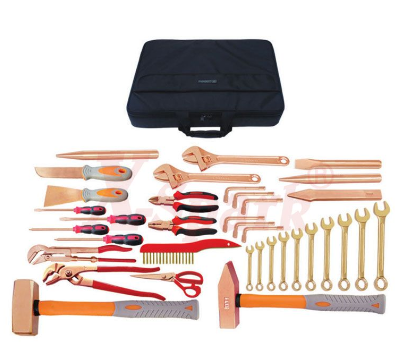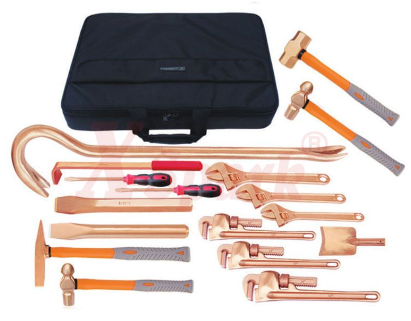How to use non-sparking tools safely? A non-sparking tool is a safety tool, especially suitable for dangerous environments such as accidents and explosions. These explosions are usually triggered in a flammable environment by sparks that result from the use of traditional hand tools made of steel. The use of these types of hand tools can cause friction, which may produce one or two sparks; even a single spark is enough to cause a heavy-duty explosion of devastating magnitude.
Other possible causes of explosions in this environment by giving off sparks are jobs that require equipment and material to be struck at with high impacts and accidental falling of steel-made hand tools on hard, rigid surfaces. Industrial non-sparking tools are a clever innovation of hand tools, with colored components. This non-ferrous metal composition can greatly reduce the risk of sparks and ignition or explosion caused by these tools. Non-sparking tools are mostly made of brass, bronze, or alloys of copper and nickel, copper and aluminum or copper, and beryllium.
Workers widely use non-sparking tools in areas prone to blasts and explosions. Generally speaking, explosions are caused by the flying of sparks, and traditional hand tools made of steel have largely caused this danger. The use of hand tools made of steel, more often than not, leads to friction. Sparks due to friction can cause a greater proportion of fires and explosions. Therefore, the demand for non-sparking tools has gained significance, leading to the widespread use of hand tools composed of non-ferrous materials.
Hand tools made of non-ferrous materials greatly reduce the risk of fire caused by sparks, and this fact has led to an unprecedented increase in the demand for these non-sparking tools. Non-sparking tools are made of non-ferrous materials, such as alloys of copper, brass, bronze, nickel, beryllium, and aluminum. Hand tools with non-ferrous composition are relatively soft, compared with similar tools in black. Non-sparking tools are used in various industries such as chemistry, oil refining, and sales.
Here are some tips for using non-sparking hand tools safely and effectively:
a) Ensure proper cleaning: It is necessary to keep hand tools clean to avoid the accumulation of dust and a layer of rust on them. Rusted tools are more prone to sparks, which can cause accidental fires and explosions.
b) Routine maintenance: Regular maintenance of tools can not only extend the service life of the tools but also improve the efficiency of the tools by several grades.
c) Store hand tools in a well-ventilated place: Hand tools must be stored in a cross-ventilated place to ensure that the tools will not accumulate moisture and dust for a period of time. It has been observed that in a fragile environment, the accumulation of dust may cause unstable sparks and fires.
d) Observe the user manual carefully: strictly abide by the manual provided by the manufacturer in letter and spirit. It pays to follow dos and don'ts meticulously as prescribed by the non-sparking tool manufacturer.


评论
发表评论